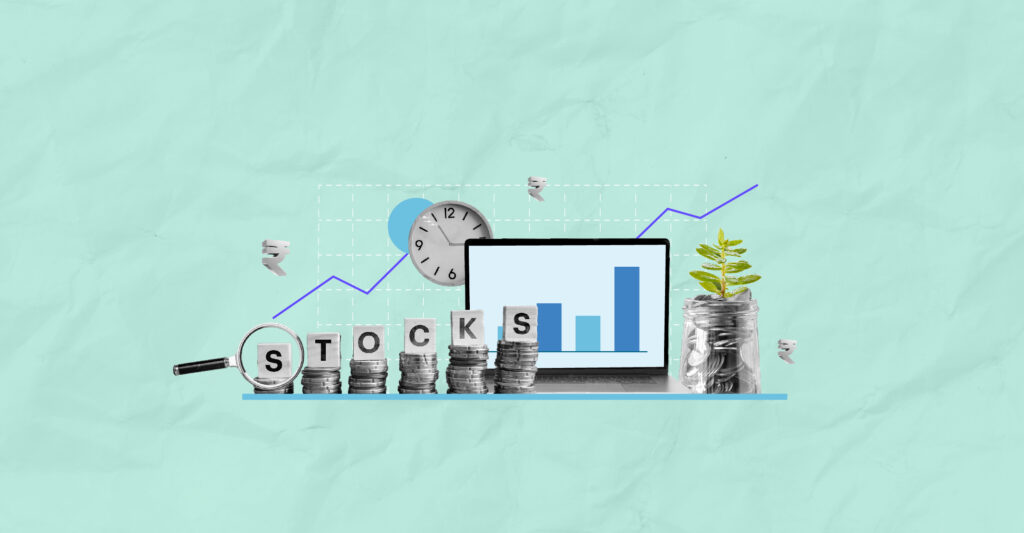Last Updated on Apr 11, 2025 by vanessa sequeira
Long-term stocks are fundamentally strong stocks that are ideal for investors looking to stay invested for a longer period to benefit from the consistent growth of the stock. It is suitable for risk-averse investors, as these stocks have good financial books and promising future projections. Based on the 5-yr CAGR, we have curated lists of best long-term stocks from the Nifty 500.
Table of Contents
Best long-term stocks in India (Large-cap)
| Best large-cap stocks | Sub-Sector | Market Cap (Rs. in cr.) | Close Price (Rs.) | 5Y CAGR (%) | 5Y Avg Return on Equity (%) | 5Y Historical Revenue Growth (%) | 5Y Historical EPS Growth (%) | 1Y Forward EPS Growth (%) |
| Varun Beverages Ltd | Soft Drinks | 1,81,629.63 | 1,397.85 | 63.44 | 18.42 | 21.55 | 46.13 | 24.13 |
| Cholamandalam Investment and Finance Company Ltd | Consumer Finance | 89,834.63 | 1,069.70 | 34.15 | 18.68 | 18.71 | 22.49 | 23.26 |
| Titan Company Ltd | Precious Metals, Jewellery & Watches | 3,19,132.49 | 3,594.70 | 28.52 | 23.76 | 20.33 | 23.49 | 12.14 |
| Bajaj Finance Ltd | Consumer Finance | 4,01,425.12 | 6,498.70 | 19.66 | 19.28 | 26.55 | 33.76 | 22.35 |
Note: The data in the above table is from 29th February 2024. The stocks are filtered using Tickertape Stock Screener using the following parameters:
- Stock Universe – Nifty 500
- Market Cap – Large-cap
- 5Y CAGR – Sorted from highest to lowest
- 5Y Average Return on Equity – High
- 5Y Historical Revenue Growth – Set the limit to 15 to High
- 5Y Historical EPS Growth – High
- 1Y Forward EPS Growth: Set the limit to 10 to High
Best long-term stocks in India (Mid-cap)
| Best mid-cap stocks | Sub-Sector | Market Cap (Rs. in cr.) | Close Price (Rs.) | 5Y CAGR (%) | 5Y Avg Return on Equity (%) | 5Y Historical Revenue Growth (%) | 5Y Historical EPS Growth (%) | 1Y Forward EPS Growth (%) |
| Jindal Stainless Ltd | Iron & Steel | 54,354.92 | 660.10 | 79.68 | 17.45 | 25.08 | 32.06 | 17.38 |
| Dixon Technologies (India) Ltd | Home Electronics & Appliances | 39,139.18 | 6,542.65 | 71.50 | 22.74 | 33.79 | 63.51 | 51.70 |
| Persistent Systems Ltd | Software Services | 63,817.00 | 8,408.35 | 66.60 | 19.01 | 21.71 | 24.44 | 19.70 |
| APL Apollo Tubes Ltd | Building Products – Pipes | 40,596.29 | 1,462.80 | 64.92 | 22.07 | 24.86 | 29.49 | 18.37 |
| Solar Industries India Ltd | Commodity Chemicals | 61,292.08 | 6,773.35 | 48.37 | 23.04 | 29.25 | 27.98 | 26.02 |
| Coforge Ltd | IT Services & Consulting | 39,951.47 | 6,464.65 | 37.39 | 21.50 | 21.66 | 20.04 | 26.04 |
| Astral Ltd | Building Products – Pipes | 55,134.35 | 2,052.45 | 33.31 | 19.55 | 20.04 | 24.22 | 46.99 |
| PI Industries Ltd | Diversified Chemicals | 55,123.52 | 3,634.15 | 31.55 | 17.97 | 23.29 | 24.85 | 29.72 |
Note: The data in the above table is from 29th February 2024. The best stocks for long-term are filtered using Tickertape Stock Screener using the following parameters:
- Stock Universe – Nifty 500
- Market Cap – Mid-cap
- 5Y CAGR – Sorted from highest to lowest
- 5Y Average Return on Equity – High
- 5Y Historical Revenue Growth – Set the limit to 15 to High
- 5Y Historical EPS Growth – High
- 1Y Forward EPS Growth: Set the limit to 10 to High
Best long-term stocks in India (Small-cap)
| Best small-cap stocks | Sub-Sector | Market Cap (Rs. in cr.) | Close Price (Rs.) | 5Y CAGR (%) | 5Y Avg Return on Equity (%) | 5Y Historical Revenue Growth (%) | 5Y Historical EPS Growth (%) | 1Y Forward EPS Growth (%) |
| Tanla Platforms Ltd | Software Services | 13,541.45 | 1,007.10 | 93.63 | 19.69 | 33.53 | 80.35 | 25.22 |
| Godawari Power and Ispat Ltd | Iron & Steel | 10,085.76 | 741.90 | 63.99 | 28.38 | 18.21 | 31.60 | 21.07 |
| Apar Industries Ltd | Electrical Components & Equipments | 25,027.07 | 6,230.55 | 58.06 | 16.89 | 19.81 | 34.53 | 19.00 |
| J B Chemicals and Pharmaceuticals Ltd | Pharmaceuticals | 24,827.32 | 1,600.20 | 57.89 | 19.33 | 16.93 | 26.39 | 35.52 |
| Central Depository Services (India) Ltd | Stock Exchanges & Ratings | 20,179.47 | 1,931.05 | 54.59 | 21.73 | 22.44 | 21.74 | 41.63 |
| Saregama India Ltd | Movies & TV Serials | 7,922.11 | 411.95 | 51.65 | 15.67 | 16.59 | 42.47 | 11.65 |
| Ratnamani Metals and Tubes Ltd | Building Products – Pipes | 21,153.06 | 3,017.90 | 39.51 | 17.56 | 20.16 | 27.45 | 19.73 |
| GMM Pfaudler Ltd | Industrial Machinery | 5,989.88 | 1,332.35 | 28.56 | 19.64 | 50.73 | 50.46 | 12.72 |
| Angel One Ltd | Investment Banking & Brokerage | 24,086.83 | 2,867.20 | 22.54 | 31.71 | 30.96 | 48.13 | 21.91 |
Note: The data in the above table is from 29th February 2024. The best stocks for long-term are filtered using Tickertape Stock Screener using the following parameters:
- Stock Universe – Nifty 500
- Market Cap – Small-cap
- 5Y CAGR – Sorted from highest to lowest
- 5Y Average Return on Equity – High
- 5Y Historical Revenue Growth – Set the limit to 15 to High
- 5Y Historical EPS Growth – High
- 1Y Forward EPS Growth: Set the limit to 10 to High
Advantages of investing in investing in stocks for long term
Long-term stock investments unveils a spectrum of advantages for investors seeking to grow their wealth over time. Here’s a some of the compelling reasons to consider this investment strategy:
- Enhanced return potential: Over the years, equities have consistently outperformed other investment vehicles like bonds, cash savings, and real estate, offering investors the opportunity for superior returns, particularly in markets like India.
- The benefit of time over timing: Attempting to predict market movements is notoriously challenging and can lead to undue stress. Opting for long-term investments in quality stocks eliminates the need to time your entry and exit, allowing you to ride out short-term market volatility with greater ease.
- Tax efficiency: Holding stocks for the long term is also tax-advantageous. In many jurisdictions, long-term capital gains are taxed at a lower rate compared to short-term gains, providing a fiscal benefit to those who stay invested for more than a year.
- Power of compounding: Long-term investments harness the power of compounding, where your investment gains generate their own gains over time. This can lead to exponential growth in the value of your investment, amplifying your wealth significantly as the years roll by.
Disadvantages of investing in stocks for long term
However, investing in long-term stocks is not without its hurdles. Potential investors should be mindful of the following challenges:
- Market volatility: The stock market is inherently volatile, with prices subject to fluctuations due to a myriad of factors including economic shifts, market sentiment, and news specific to individual companies.
- Liquidity concerns: Long-term investments mean your capital is tied up in stocks that may not be easily liquidated without potentially incurring losses. This could pose a problem if you find yourself in need of quick access to funds.
- Company-specific risks: Investing in individual stocks exposes you to risks unique to that company, such as management missteps, legal challenges, or threats from competitors. These risks can impact the stock’s performance and, by extension, your investment.
Guidelines for selecting stocks for long-term Investment
When exploring the best stocks to hold over an extended period, it’s crucial to weigh multiple factors, such as:
- Financial health of the company: Seek out firms with robust financial foundations, which is evident in their strong balance sheets, consistent cash flow, and a history of progressive earnings.
- Leadership quality: The presence of a competent management team with a proven track record is indicative of a company’s efficient operations and is a positive sign for long-term investment prospects.
- Unique market position: Opt for businesses that have a distinct competitive edge, be it through a well-established brand, an innovative product offering, or exclusive technology.
- Alignment with market movements: Identify companies that are well-positioned to leverage ongoing market shifts, such as the move towards sustainable energy sources or the growth of digital commerce.
To conclude
Before deciding on which long-term stock to invest in, here are a few things to keep in mind –
- Do your due diligence on the financials, like – the balance sheet, income statement, etc., to identify financially sound companies.
- Explore stocks that align with your risk appetite.
- Invest in a business that you follow and understand.
- Check for the ‘Analyst Buy Reco‘ as it represents buy recommendations from an Analyst aligned with Tickertape. To get this information, go to your desired stock page, and click on ‘Forecast’. There you will get the percentages of Analyst buy recommendations. For instance, here’s an analyst buy reco of Reliance Industries Ltd.
- Conduct a peer comparison to evaluate the company’s performance against its competitor.
In addition to evaluating the stocks on the above parameters, you can also evaluate profitability, valuation, technical indicators and many more with the pro version of Tickertape. Explore today!
FAQ
Which long-term stocks to buy?
Fundamentally strong stocks are quoted as the ‘shares to buy for the long term.’ These stocks are financially stable and are suitable for investors looking to invest in low-risk stocks.
Which are the best stocks for the next 5 years?
The definition of ‘best stocks for the next 5 years’ aligns with your financial goal. While blue chip stocks offer stability and consistent returns, and small-cap stocks offer volatility and the chance to make hefty returns. Depending on your financial goal, you can select the stocks.
- Credit Limit Overutilised - Sep 9, 2025
- Best Gold Companies in India (2025) - Jun 5, 2025
- Top Adani Group Stocks in India (2025) - Jun 4, 2025






